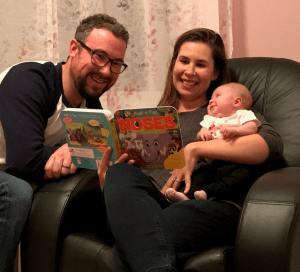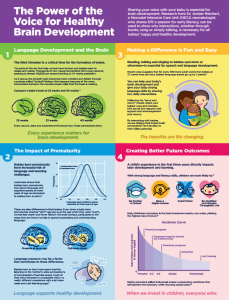Lori Blahey is a former Senior Marketing Consultant at EPL.
 EPL staff have intuitively known for years that having fun, daily interactions with your baby is a simple and powerful way to give your child an advantage for life. Now, local research shows just how crucial language—whether through books, songs or simply talking—is for healthy brain development.
EPL staff have intuitively known for years that having fun, daily interactions with your baby is a simple and powerful way to give your child an advantage for life. Now, local research shows just how crucial language—whether through books, songs or simply talking—is for healthy brain development.
Dr. Amber Reichert is a neonatal intensive care unit (NICU) neonatologist and fan of the Library. Since 2018, she has worked with EPL to spread the love of reading to families of premature babies and hospital staff through the Library’s own Welcome Baby program, which puts books in the hands of families across the city.
Beyond a passion for literacy, Dr. Reichert understands the science behind why language plays such a crucial role in our overall health. As the Medical Director of the Glenrose Neonatal Follow-Up Clinic for premature babies, Dr. Reichert sees firsthand how differences in language exposure contribute to babies’ brains development.
To learn more about Dr. Reichert's research, keep reading or click the image on the left to view the summary.
View all citations here.
The Impact of Prematurity
As part of a preemie’s follow-up care, Dr. Reichert tracks their language and cognitive scores. She has found that preemies at three years of age have noticeably lower scores than those of babies born to term.1 Brain maps also show visible differences in the surface of a preemie’s brain, particularly in the areas that are known to help in speech processing and understanding language.2
Why the difference?
As Dr. Reichert explains, “Brain development in the first few years of life impacts the brain for life. When a baby is born to term, they have spent the third trimester—a crucial time for brain development—listening to their mother as she talks and goes about her day. Preemies, on the other hand, are in the NICU, where they hear a lot more noise and a lot less language.” Recent data supports this idea, showing that for every 100 more adult words that babies at 32 weeks hear per hour, their language scores go up by two points.3
With almost 10% of Edmonton babies born prematurely every year,4 Dr. Reichert knew something had to be done. Working together, EPL and Dr. Reichert’s team expanded the Welcome Baby program to three local NICUs, providing families with resources to help them share their voices with their littlest listeners.
 When babies feel safe and soothed, it’s easier for their brains to take in new information. For parents, singing and talking can be a calming way to connect with a baby during stressful moments. Working together as a team, infants, parents and hospital staff have an opportunity to help each other in ways that truly matter—all by using songs, stories and words.
When babies feel safe and soothed, it’s easier for their brains to take in new information. For parents, singing and talking can be a calming way to connect with a baby during stressful moments. Working together as a team, infants, parents and hospital staff have an opportunity to help each other in ways that truly matter—all by using songs, stories and words.
New mom Corina Braund agrees. “What a surprise to receive the Welcome Baby package during our time at the Misericordia NICU with our baby girl. It was such a lovely gesture, especially during such a challenging time. Learning that, even as a newborn, reading and music help Lily’s development also encouraged us to read to her every day.”
The Power of Voices
While reading, talking and singing are seemingly simple things to do, sharing meaningful, daily interactions with babies can change the course of a child’s life.
“Reading to babies isn’t just nice, it’s necessary,” said Tamsin Shute, EPL’s Youth Services Librarian responsible for the Welcome Baby program. There is overwhelming evidence that strong early literacy skills—everything children need to know to learn to read and write—is essential for better grades, better jobs, better health and ultimately, a better life. Conversely, low literacy skills are connected to lower employment, poorer health and higher chances of incarceration.5
Investing in the early years (prenatal up to three years old) makes financial sense too. According to Nobel prize winning economist James Heckman, the earliest investments in children yield the highest rates of return compared to programs that target preschoolers and older children.6
What can parents of a young infant do?
Parents are a child’s first and best teacher, so the interactions they have with their children matter most. Simply by spending time together, parents are helping their children’s brains build powerful neurological connections and develop to their fullest potential.
While there is a lot of advice out there, EPL encourages parents focus on two elements:
- Share your voice—whether parents read books, sing songs or simply talk, the key is that children are exposed to language. While newborns may love hearing you read a board book, the content isn’t important, so do what’s comfortable: whether it’s reading a few chapters from a Stephen King novel, singing Beyonce’s latest track or narrating an Oilers game. Also, make sure to speak in your home language since this will help your child build a strong foundation to learn other languages down the road, including English.
- Follow the “serve and return” model—this is a simple concept that highlights the importance of child-adult relationships that are responsive and caring. When a baby babbles, gestures or cries, parents respond with support and encouragement whether through eye contact, words or even a hug. These back-and-forth interactions are the foundation for healthy brain development.7
Of course, EPL is always here to support parents. Learn how to help your child develop early literacy skills or visit our new page just for parents, with links to free resources for you or the child in your life.
- Three-year speech assessment data from 234 pre-term babies born between 2009-2013 who visited the Glenrose Rehabilitation Hospital in Edmonton for follow up visits between 2012-2016.
- Van Essen Lab Wiki homepage (Washington University in St. Louis), in collaboration with Terrie Inder, Jeff Neil, Jason Hill, and others. https://neuroscience.wustl.edu/items/van-essen-lab/
- Caskey, Melinda & Stephens, Bonnie & Tucker, Richard & Vohr, Betty. (2014). Adult Talk in the NICU With Preterm Infants and Developmental Outcomes. Pediatrics. 133. 10.1542/peds.2013-0104. Retrieved from https://www.researchgate.net/publication/260153980_Adult_Talk_in_the_NICU_With_Preterm_Infants_and_Developmental_Outcomes
- Public Health Agency of Canada (2017). Perinatal Health Indicators for Canada 2017. A Report From the Canadian Perinatal Surveillance System. Retrieved from http://publications.gc.ca/collections/collection_2018/aspc-phac/HP7-1-2017-eng.pdf
- Zauche, Lauren & Darcy Mahoney, Ashley & Zauche, Michael Stapel-Wax, Jennifer. (2017). The Power of Language Nutrition for Children’s Brain Development, Health, and Future Academic Achievement. Journal of Pediatric Health Care. Volume 31 Number 4. 493-503. Retrieved from https://www.jpedhc.org/article/S0891-5245(16)30311-X/fulltext
- “The Heckman Curve.” The Heckman Equation, 8 Feb. 2017, http://www.heckmanequation.org/resource/the-heckman-curve/. Accessed on October 9, 2019.
- “Serve and Return Guide: How Interaction with Children Can Build Brains.” Center on the Developing Child at Harvard University, http://www.developingchild.harvard.edu/guide/a-guide-to-serve-and-return-how-your-interaction-with-children-can-build-brains/. Accessed on October 4, 2019.



Add a comment to: How Talking to Your Baby Helps Their Brain Develop